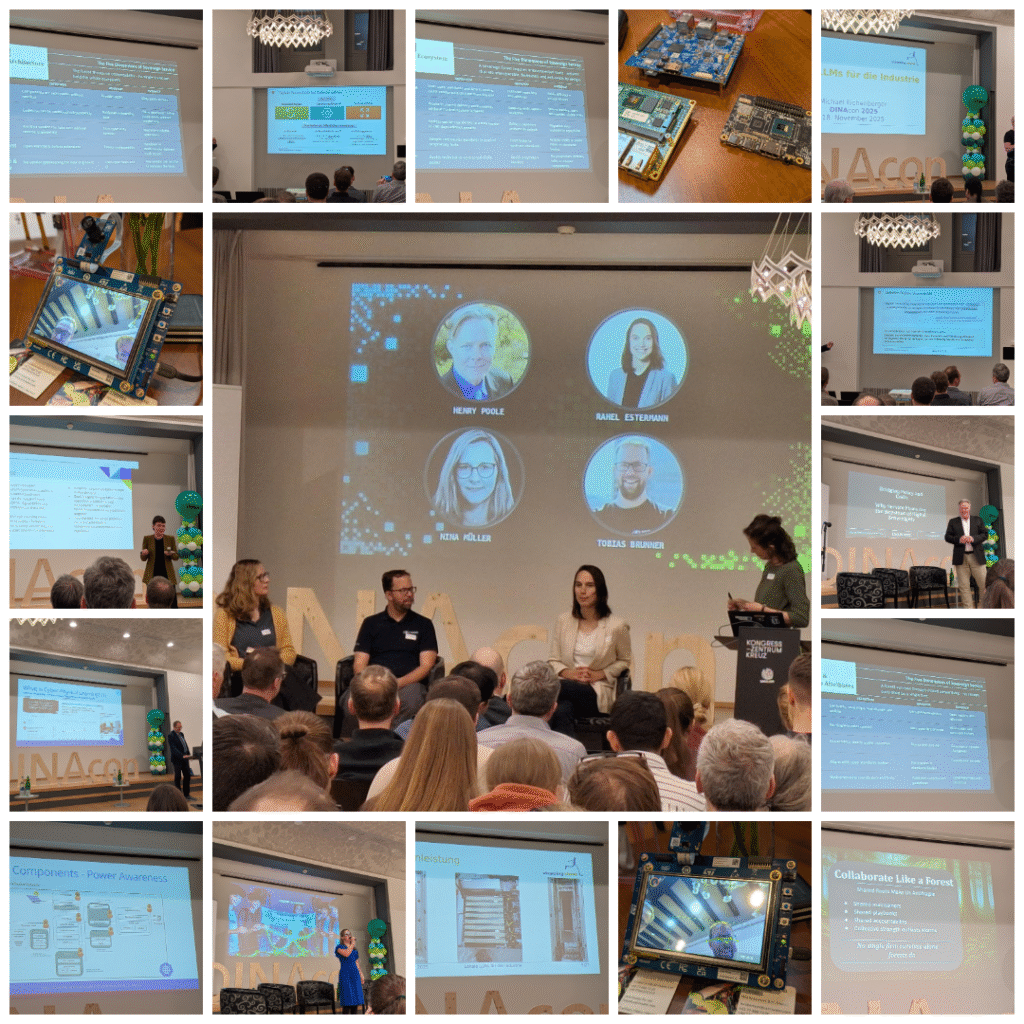DINAcon 2025: Sovereignty Needs Collaboration, Courage, and Real Openness



DINAcon 2025 took place on Tuesday, November 18 at the Kongresszentrum Kreuz in Bern, and VSHN was right in the middle of it. Tobias Brunner was invited as a panelist, joining Henry Poole, Nina Müller from Nextcloud, and Rahel Estermann to discuss digital sovereignty. The message was clear: we are moving in the right direction, but we are far from finished.
And the atmosphere? A mix of curiosity, realism, and momentum.
AI is everywhere. But it is not sovereign yet.
A dominant theme across the conference was Artificial Intelligence. Nearly every session, conversation, and coffee break circled back to it. The key realization: AI is already here, but it is not yet sovereign.
One highlight was the demo of MeLODy – Der intelligente Linked Open Data Chatbot, developed for public administration in the City of Zurich and the Canton of St. Gallen. Here, AI is not only being discussed in theory, but actively used in real applications. That is encouraging and shows that progress is not just conceptual, but operational.
Switzerland already has strong foundations: law, infrastructure, and community
There was also positive news. Tobias pointed out during the panel that Switzerland already has several important building blocks in place.
- EMBAG creates clear legal requirements for the use of open source in public administration
- GPU capacity for sovereign AI is already available, for example at Stepping Stone, and providers like Exoscale and Cloudscale also offer AI compute
- With Apertus, a Swiss LLM is emerging. It is not finished yet and not on the level of large foundation models, but it is a start and publicly testable at Public AI Inference Utility
So the foundation exists. Now we need to build on it together.
Ecosystems are forming. Companies are investing.
Another key takeaway from DINAcon was the momentum in the European tech landscape.
- The Heinlein Group is investing heavily in Open Cloud, a fork of ownCloud and direct competitor to Nextcloud, and is expanding its presence with a new office in Switzerland
- Open source culture was visible not only in technology, but also creatively. There was even open source music: Music Album Open Up | Open Source | MD Systems GmbH
Solche Entwicklungen zeigen, dass Open Source längst kein Nice-to-have mehr ist, sondern StThese developments show that open source is no longer a nice-to-have. It has become a strategic differentiator.
Panel insights from Tobias Brunner
During the panel, Tobias addressed three key questions.
What was the worst misuse of the term digital sovereignty?
Tobias began with a clear definition of sovereignty, summarised in three pillars:
- Confidentiality: Who has access to my data and under which jurisdiction?
- Availability: Do I always have access or is there a technical or legal kill switch?
- Control: Am I free to move or export my data, or am I locked into proprietary licenses, APIs, or opaque operating models?
Many providers today fulfil only one or two of these pillars, yet still label their solutions as sovereign. Unfortunately, many such offerings already exist and there is even a name for it: Sovereignty Washing.
Ein Beispiel, das er nannte: Ein Anbieter betreibt Infrastruktur in einem Schweizer Rechenzentrum und Tobias shared an example: a provider runs infrastructure in a Swiss data center and advertises Swiss hosting and data portability. Yet the provider is subject to a foreign jurisdiction with extraterritorial access laws. The result: the solution looks sovereign on the surface, but underneath it is not. These grey areas make decision-making extremely difficult for organisations striving for sovereignty.
How can Switzerland take a sovereign role in global software supply chains?
His answer was clear: not by doing everything alone, but by working together. Tobias stressed that historically, Switzerland has always found ways to be part of global value chains, even when production physically happened elsewhere. The same applies to software. To achieve this, three things are needed:
- open standards instead of proprietary protocols
- open source software as a shared foundation
- shared ecosystems and collaboration between cloud providers, developers, and operators
For years, hyperscalers have repeated the narrative that data must move to them. Today, this has led to dangerous centralisation of power and infrastructure. Tobias flipped the logic: why not bring the services to the data?
This idea was the spark for Servala – The Sovereign App Store. An open platform that connects cloud service providers, software vendors, and enterprise clouds while giving customers true freedom of choice.
At the end of the discussion, the panelists were asked for their call to action for organisations and public institutions.
Tobias closed with a simple but clear message:
Understand the value of sovereign software services for your organisation and start using them. It is never too late to become sovereign.
Conclusion
DINAcon 2025 made one thing clear: we have the expertise, the community, the infrastructure, and the legal frameworks. But we need more courage and more collaboration to achieve real digital sovereignty.
Not just marketing terms. Not just buzzwords. But real control over data, infrastructure, and value creation.
At VSHN, we will continue to drive this vision forward. And we look forward to building this sovereign future together.
If you would like to continue the discussion or have questions, get in touch. We are happy to continue the conversation.